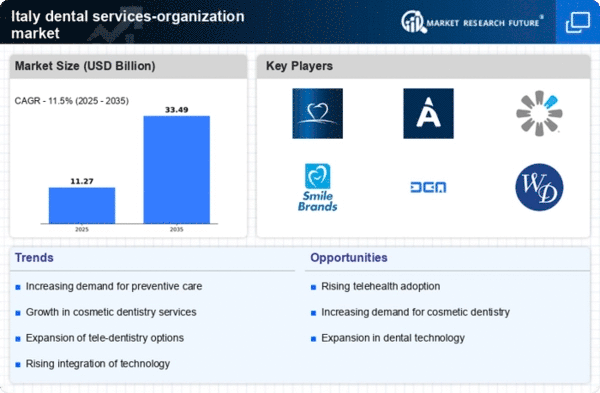The dental services-organization market in Italy is characterized by a competitive landscape that is increasingly shaped by innovation, strategic partnerships, and digital transformation. Key players such as Heartland Dental (US), Aspen Dental (US), and Smile Brands (US) are actively pursuing growth strategies that emphasize operational efficiency and enhanced patient experiences. Heartland Dental (US), for instance, focuses on expanding its network through strategic acquisitions, thereby increasing its market share and operational footprint. Meanwhile, Aspen Dental (US) is leveraging technology to streamline patient interactions and improve service delivery, which appears to resonate well with the evolving consumer expectations in the dental sector. Collectively, these strategies contribute to a dynamic competitive environment where adaptability and responsiveness to market demands are paramount.
The business tactics employed by these organizations reflect a nuanced understanding of the market's structure, which is moderately fragmented. This fragmentation allows for a variety of service offerings, yet the influence of major players remains substantial. Companies are increasingly localizing their operations to better cater to regional preferences, optimizing supply chains to enhance service delivery, and investing in digital platforms to facilitate patient engagement. Such tactics not only bolster operational efficiency but also enhance customer satisfaction, thereby reinforcing brand loyalty in a competitive market.
In October 2025, Heartland Dental (US) announced a strategic partnership with a leading telehealth provider to integrate virtual consultations into its service offerings. This move is significant as it aligns with the growing trend of digital health solutions, allowing Heartland Dental to expand its reach and provide more accessible care options to patients. The integration of telehealth services is likely to enhance patient convenience and satisfaction, positioning Heartland Dental favorably in a market that increasingly values flexibility and accessibility.
In September 2025, Aspen Dental (US) launched a new initiative aimed at enhancing patient education through digital platforms. This initiative includes the development of interactive online resources that empower patients to make informed decisions about their dental health. The strategic importance of this move lies in its potential to foster patient engagement and loyalty, as well-informed patients are more likely to seek regular dental care. By prioritizing education, Aspen Dental is not only differentiating itself from competitors but also contributing to improved health outcomes in the communities it serves.
In August 2025, Smile Brands (US) expanded its operations into several new regions in Italy, focusing on underserved areas. This expansion is indicative of a broader trend where companies are seeking to fill gaps in service availability, thereby enhancing access to dental care. The strategic importance of this move is multifaceted; it not only increases Smile Brands' market presence but also addresses critical healthcare disparities, positioning the company as a socially responsible entity in the dental services landscape.
As of November 2025, the competitive trends in the dental services-organization market are increasingly defined by digitalization, sustainability, and the integration of artificial intelligence (AI) into service delivery. Strategic alliances are becoming more prevalent, as companies recognize the value of collaboration in enhancing service offerings and operational capabilities. Looking ahead, it appears that competitive differentiation will increasingly pivot from traditional price-based competition to a focus on innovation, technological advancements, and the reliability of supply chains. This shift suggests that companies that prioritize these elements will likely emerge as leaders in the evolving dental services landscape.

















Leave a Comment